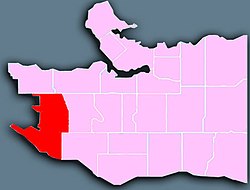|
Dunbar–Southlands
Dunbar–Southlands is a neighbourhood situated on the western side of Vancouver, British Columbia, Canada, that stretches north from the Fraser River and covers most of the land between the mouth of the Fraser and English Bay. This neighbourhood consists of many commercial and residential areas that mostly consists of single-family dwellings. It also contains parts of the Mackenzie Heights enclave, and is the home territory of the Musqueam Indian Band. HistoryArchaeological findings shows that native First Nations have inhabited the area was early as 400 B.C. The Fraser provided large amounts of hunting and fishing areas for Salish Indians who settled at three locations. As recently as 15,000 years ago, it was buried under a sheet of glacial ice.[2] In 1908, the land in the Dunbar area was owned by the Canadian Pacific Railway and was part of the now defunct, Municipality of Point Grey. At that time, the land was unstable for development. The first non-native settlers purchased a lot on 22nd Avenue. By 1927, the area was served by three streetcar routes. Dunbar–Southlands became a part of Vancouver in 1929 when the Municipality of Point Grey merged with the City of Vancouver. The first major land development in Dunbar–Southlands took place in the mid-1920s with some of the homes that were built during this period still standing to this day. Due to West Point Grey's 1922 zoning, by-laws ordered that these early homes be situated on the back of their lots; those that remain stand out as neighbourhood landmarks.[3] GeographyDunbar–Southlands is bordered on the north by West 16th Avenue and on the south by the Fraser River; it stretches from the University Endowment Lands on the west to Mackenzie, Quesnel and Blenheim Streets in the east. The neighborhood is centered on Dunbar Street while the vicinity of Southlands lies south of Marine Drive in the floodplain of the Fraser River, and the Musqueam Indian Reserve is also encompassed by the region.[4] Demographics
Parks and servicesThe Vancouver Park Board and the Metro Vancouver Regional Parks maintains a total of 10 parks in Dunbar–Southlands,[8] including the Pacific Spirit Park, which contains 55.5 km of trails.[9] The Dunbar Community Centre is jointly operated by the Vancouver Park Board and the Dunbar Community Centre Association.[10] The Vancouver Public Library also maintains a branch in the Dunbar–Southlands district. The Vancouver Fire and Rescue Services operates the Vancouver Fire Hall No 21 which serves the Dunbar region. The area also contains many golf courses including the Musqueam Golf Course, Point Grey Golf Club, Shaughnessy Golf Club, and Marine Drive Golf Club.[11] Notes
ReferencesWikimedia Commons has media related to Dunbar–Southlands.
|
||||||||||||||||||||||||||||||||||||||||||||||||||||||||||||||||||||||||||||||||||||||||||||||||||||||||||||||||||||||||||||||||
Portal di Ensiklopedia Dunia

